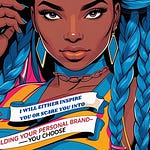Being a solo founder is way lonelier than I expected. I spend all day in my own head… No team to brainstorm with, no co-workers to joke around with… just me, my laptop, and a ridiculous amount of overthinking.”— Reddit, r/smallbusiness
“It’s the loneliness that kills you… Your friends don’t get it. Your family thinks it’s a hobby. And some days, you doubt yourself too.” — Reddit, r/Entrepreneur
“Building a SaaS is f**king lonely…the motivation is there some days, other days it feels like pushing a boulder uphill.” — Reddit, r/SaaS
“Having no one to share the lows is really hard. Even with family and friends… they will never really understand.” — Wisp Blog
📱Screenshot from Mandy
I got that message on Tuesday.
By then, I’d already cried through Sunday and Monday. I’d already shown up to strategy calls. Prepped outreach. Wiped tears between calendar blocks. The week was heavy in that specific scrappy founder way—when the personal is falling apart but if you pause to feel it…God, if you pause to feel it!
And then Mandy texted. And I remembered what a gift it is to not be running any of this solo.
She didn’t ask for context. She didn’t need a play-by-play. Not just because we work in the same company so, obviously she knows. But also because she knows what it means to carry the same weight. What it means to not have time to stop, because who stops just as they are beginning to get traction?
That text let me stop. I didn’t read her Tuesday newsletter as we usually do for each other. I didn’t push another email. I just paused.
Turns out my world wasn’t falling apart. I just needed air.
And when I sat again at my desk on Wednesday, I couldn’t think about our community the same way.
Because founders need other founders in the room — the same way women need other women in the room. The same way women of color need other women of color. It’s not luxury. It’s not fluff. It’s how we breathe through the build.
The loneliness isn’t the problem. The systems are.
So this week when I saw this post from Jamie Koll, it hit me:
It’s not even just the loneliness that makes building dangerous. It’s the structural gap. How that gap has us recycling problems another woman a few internet square meters away from us just solved.
Because, honestly, while women founders are trying to duct-tape together WhatsApp groups and Instagram DMs, the broader system(largely occupied by men) already has systems.
They don’t call it community — they call it infrastructure.
Y Combinator. On Deck. AngelList. Discords. Alumni groups. Founder “dating” apps (yes, they exist).
It’s all community. Just rebranded as strategy.
But here’s the truth:
Most of Silicon Valley is designed to make sure men don’t have to build alone.
And it’s working.
Meanwhile, we try. We try to figure it out ourselves. We think if we’re resilient enough, visionary enough, we’ll get through.
But no founder — no matter how smart or strategic — was built to hold all this alone.
We need to build like it’s a marathon.
With water stations.
With pacing partners.
With systems that make the whole thing survivable.
And that should be the standard.
Story Time: The Room That Saved Her
Once a month, Zahra Shah closes her laptop, settles into her chair, and joins a Zoom room that feels more like home than any office ever did.
They’re twelve women on the screen—female founders of all stripes: RegTech, AI, e-commerce, health-tech. They call it the “stand-up”—a ritual born from Google’s Female Founders Immersion program in 2020. This space became something else entirely.
These sessions were simple in setup: an hour-long monthly check-in with three rules—show up, speak truth, and keep everything confidential. But the real power wasn’t in the format. It was in the faces on the screen.
There was empathy when Zahra spoke about burnout disguised as resilience. Solidarity when she told them how her tone shifted in investor calls. Nod after nod as she described the exhaustion of translating her identity into professional confidence. In that room, she wasn’t the only one who had to juggle kids, cohort expectations, and compliance checklists in a world coded by men. Because these women were carrying the same.
Over time, the ritual became her anchor. Out of solidarity became structure. They started tracking progress: “I raised £X,” “I tried that pitch tweak,” “I followed up with investor Y.” This wasn’t pep talk—it was peer accountability. They held each other to it. They celebrated the risks. And they kept the ritual alive when the program ended.
Then, one moment proved its grit. Founder Shirley Billot shared how her beauty-tech brand kept stalling in Germany. Maria‑Liisa Bruckert—another founder in the room—offered her contacts, time and team. And together, they launched. No pitch event needed to convince some higher up. No power panel. Just direct support from one founder to another.
That moment wasn’t a bullet in a press release—it was evidence. Evidence that this wasn’t networking, or surface-level mentorship. But something to actually hold them up. Peer-fueled resilience. Survival.
It’s a model you don’t read about in growth stories much. And yet you can find all the metrics that matter here.
They’re in the founders who still show up and hold each other, still believe, still scale.
The Founder, the Mother, and the Collapse
By the time Zahra Shah joined Google’s Women Founders Immersion Program, she’d already built what most would call a successful career.
Cambridge graduate. Former consultant at Accenture. Co-founder of a privacy-tech startup. Sitting on the ICO’s Technology Advisory Panel. She knew regulation, data compliance, commercial strategy. She knew how to lead.
But none of that insulated her from what was unraveling at home.
Her children were home full-time. Her team was remote. Her inbox never slept. And somewhere between closing funding rounds and preparing product updates, Zahra realized she hadn’t had an unfiltered conversation in weeks. Not one that didn’t require her to translate herself.
She could articulate GDPR intricacies in front of regulators, but couldn't name—out loud—what it felt like to juggle international compliance, hiring fires, and school schedules… while being the only woman of color in nearly every strategic room she entered.
And when the Google program started, she nearly didn’t show up.
It was one more obligation. One more call on her calendar. One more space she assumed she'd have to perform in.
But that first “Founder Standup” was different.
The instructions were simple: name a win, name a low, name something you’re stuck on.
Zahra shared.
Not the sanitized version, or the bio line.
She talked about the sharp, burning fatigue. She talked about the invisible labor of being a mother in tech. Of being “senior,” but never centered.
And she was met with resonance. Nods and how others were navigating it all. Others who got it!
When the program ended, Zahra didn’t let the ritual end with it. She and eleven others committed to showing up again. Same hour. Same honesty. Same rhythm. They recreated the structure—not because they were told to, but because it had made them feel human again.
This wasn’t a community built on aesthetics or brand alignment. It wasn’t a vision board gathering. It was business-saving, breath-giving infrastructure. Built out of necessity.
And that’s what makes Zahra’s story so rare—and so vital.
Because most founder narratives skip this. They don’t talk about the mothers holding equity and bedtime routines. They don’t show you the WhatsApp groups where a founder quietly asks, “Has anyone dealt with a co-founder who’s pulling away?”
They don’t name what it means to be brilliant, capable—and still unseen.
Zahra’s power didn’t come from pushing through.
It came from choosing to be witnessed. And then making sure no one in her circle had to go without that again.
For Founders: The Support We Want Doesn’t Sound Like a Panel
Founders don’t need more panels.
We don’t need another newsletter telling us to “take care of ourselves” between back-to-back investor calls, team fires, and weekend product updates. What we need is someone in the room who gets it — and who’s willing to sit in the mess with us while we figure it out.
Because it’s not just lonely. It’s isolating in a way most people can’t name.
When you’re the one making payroll, pitching investors, keeping the roadmap alive — there’s no one checking in to ask if you’ve eaten. You show up to founder mixers and feel like the only real builder in the room. You try community platforms but get lost in the noise. What you want — what you actually need — is something small. Consistent. Human.
Zahra and her cohort didn’t build a network. They built a safety rail.
Here’s what it looked like — and why it worked:
1. Small group. Clear rhythm. No fluff.
Twelve women. One hour a month. Same agenda every time:
What’s working.
What’s hard.
What you’re stuck on.
What you’re committing to before next month.
No opt-ins. No inbox overwhelm. Just founders showing up to say: I’m still here.
Why it matters: You can only be vulnerable when you know there’s structure to catch you.
2. No translation required.
Zahra didn’t need to explain why a cofounder pulling away felt like more than strategy drift. Shirley didn’t need to justify why entering Germany felt impossible. Deborah didn’t need to over-explain the weight of showing up as both mother and CEO. They spoke. They were heard. And they were helped.
Why it matters: When you’re the only one in the room who looks like you, half the battle is just being understood. This made space for full sentences.
3. Real strategy, not empty support.
They didn’t just nod and send emojis. They offered intros. Scripts. Tactical responses. One founder was stuck on a pricing page. Another had an investor ghost. Someone else had a team issue she couldn’t name yet. Every session ended with action.
Why it matters: Founders don’t need hype. We need help that moves the needle.
4. No one needed to be “the expert.”
This wasn’t a program. It wasn’t led by someone who’d exited three times and now runs a podcast. It was peer-led, founder-held, and self-sustaining. That’s why it lasted. It still does.
Why it matters: Sometimes the smartest advice doesn’t come from someone 10 steps ahead — it comes from someone two steps beside you.
The Call That Knows What You Didn’t Say
I’m writing this on a Wednesday. Just one day removed from a week that bent me in half.
I live in a house with my partner and two sisters. By all accounts, I’m not alone. But when things start to come undone — when the weight of the business collides with the weight of being a person — they don’t always know what to say. They love me. But they don’t live this.
My real support?
She’s in Cape Town. Thousands of kilometers away.
And one call with her, even if we don’t talk about anything urgent, does more for my nervous system than five check-ins from people I adore but still have to translate myself for.
Because she gets what else is taking up space.
She gets the mental tabs that never close. The second-guessing. The micro-shifts in posture after another uncertain potential client call. The Monday morning dread masked as “resilience.” She gets that I’m not being dramatic. I’m being stretched.
That’s not just friendship. It's being seen by someone who can help.
That’s infrastructure.
Until every founder has someone like that — someone who sees the chaos and still believes you’re capable of more — we’re not just building in silence.
We’re building at risk.














Share this post